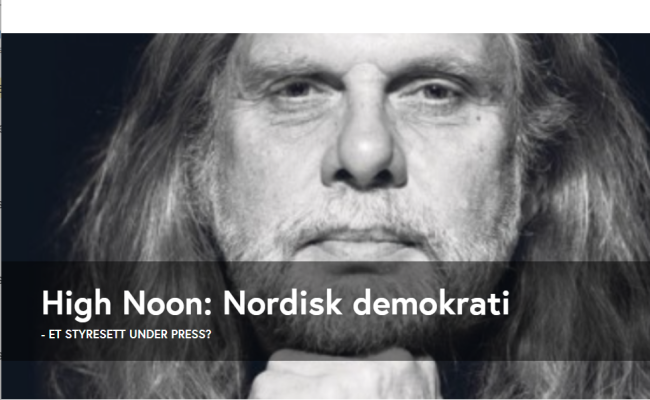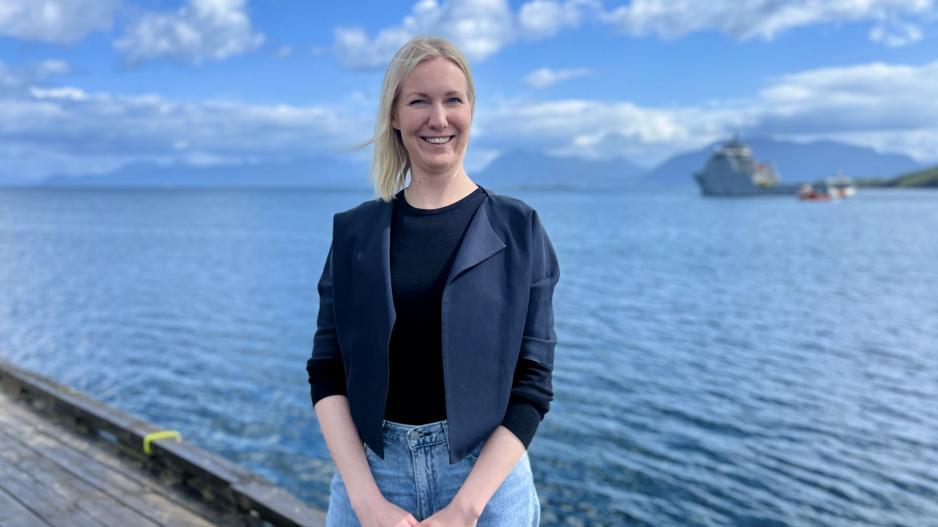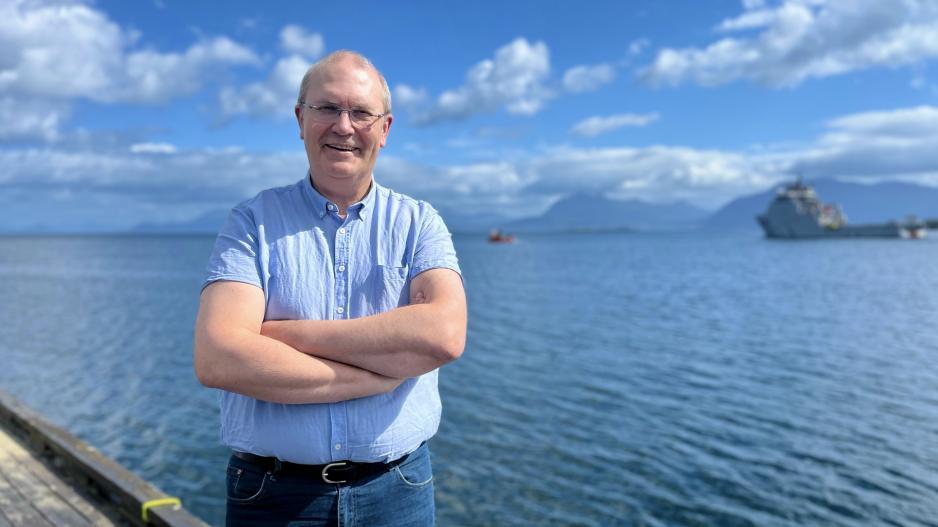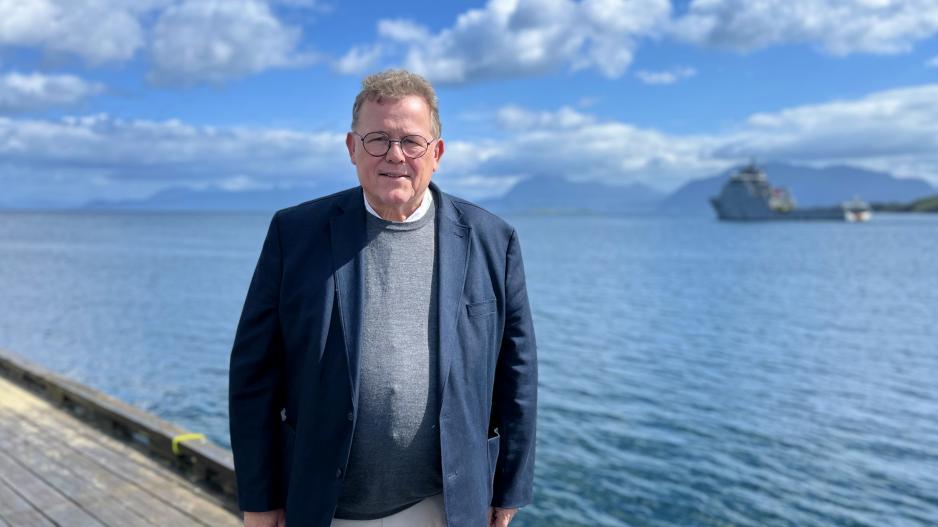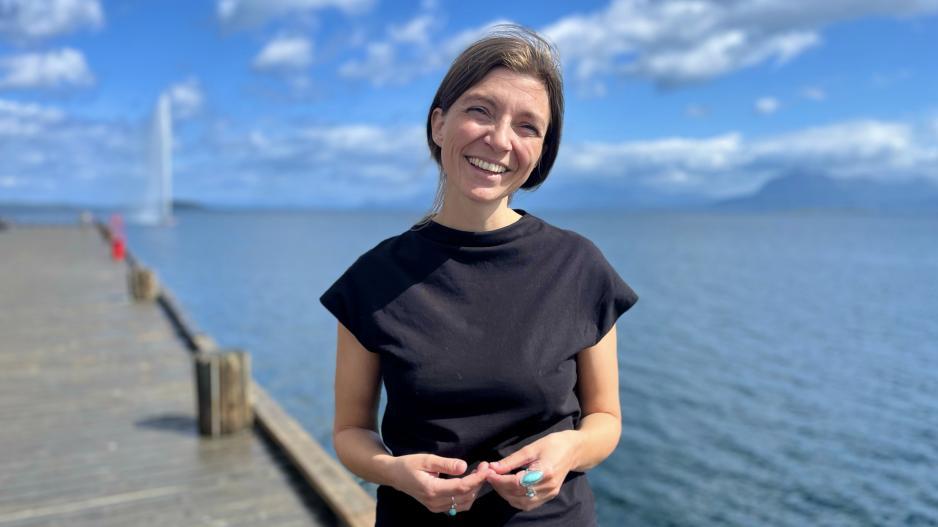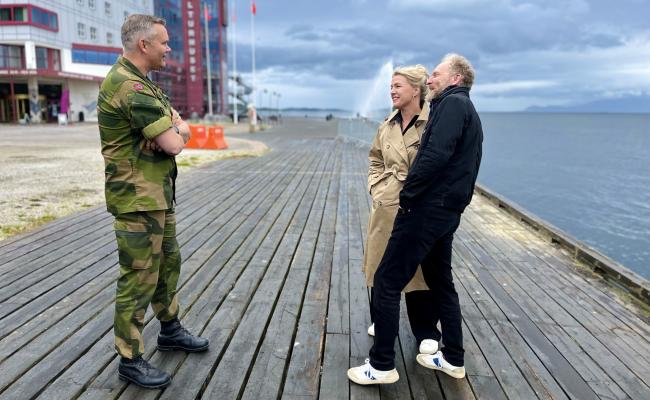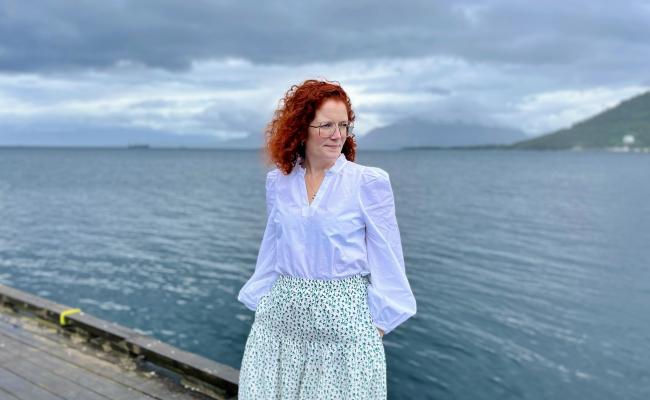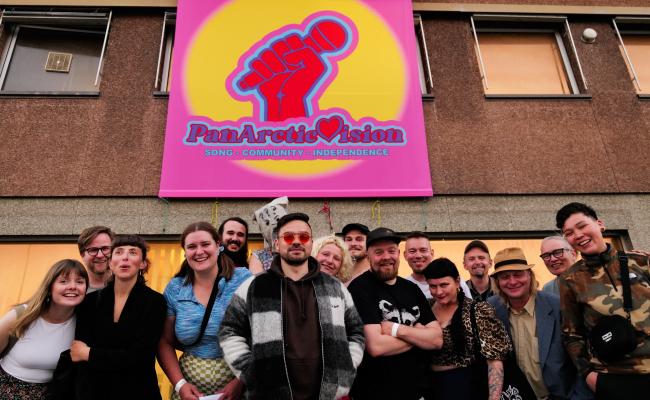High Noon: Amund Sjølie Sveen: Uses Art As Testing Ground for Major Political Ideas and Critique of Power
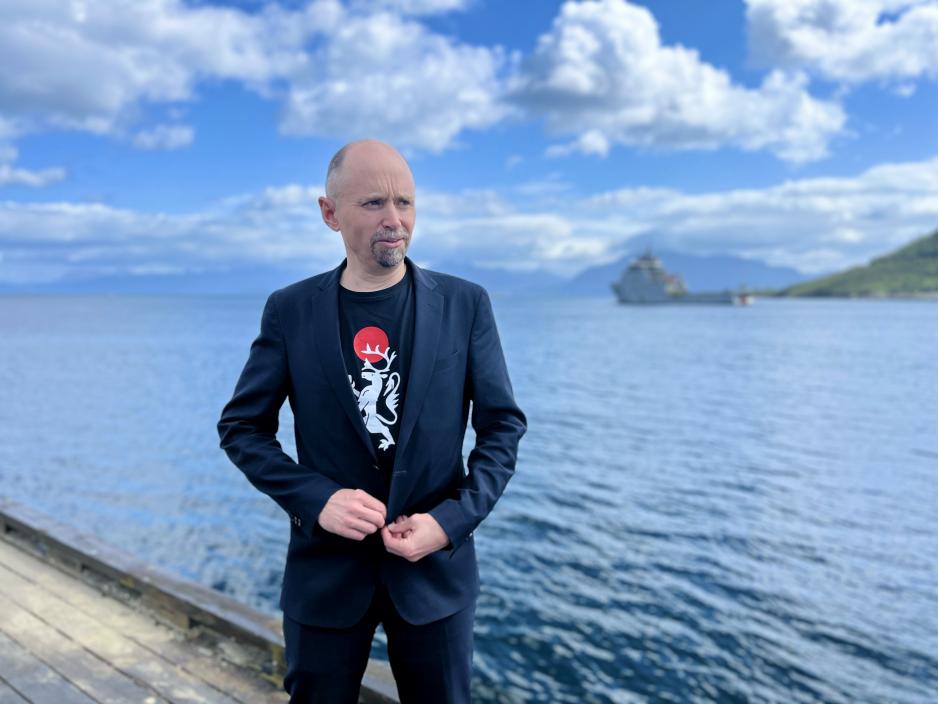
The primary guest of the High Noon debate on democracy and trust: Amund Sjølie Sveen, artistic and political director of Nordting. (Photo: Astri Edvardsen)
Harstad (High North News): For ten years, Amund Sjølie Sveen has traveled the Arctic with Nordting – a people's movement and an artistic-political project. With political analyses, critical takes on power, and referendums – with supplementary sing-alongs, dancing, and vodka – Nordting offers a democratic arena to explore a different world.
At the end of June, the debate series High Noon was organized in Harstad, Northern Norway, through cooperation between the Arctic Arts Festival and High North News.
Nordic democracy was the topic of the third debate of the series.
The Nordic countries are all at the top of the Economist Democracy Index. So, what still puts the most democratic countries in the world to the test? Is the crucial trust in our democracies challenged?
Primary guest: Amund Sjølie Sveen, artistic and political director of Nordting.
Of current interest: Nordting, perhaps Northern Norway's most discussed art project of political character and sting, is turning ten years old this year. The first 'ting' or assembly was held in Harstad, during the Arctic Arts Festival in 2014. It contained criticism of fisheries policy, oil sponsoring, and the festival itself. The anniversary was marked this summer with new challenges of mental, geographical, and political ideas, and with the unveiling of the sculpture 'Riksreinen' ('The National Reindeer') in the town square. Singing, toasting, and flagging were also part of the celebration.
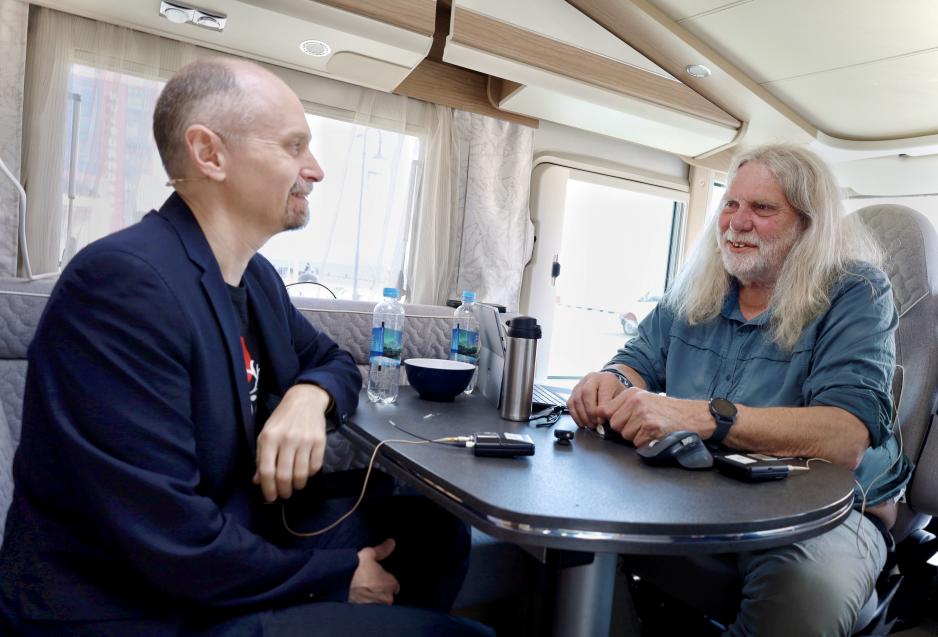
Amund Sjølie Sveen in conversation with High North News Editor Arne O. Holm, leader of the High Noon debate series. (Photo: Astri Edvardsen)
Nomadic parliament
Nordting is, in its own words, "a nomadic people's parliament of the North, a party for the periphery, a separatist movement for the Arctic colony."
In this project, art and politics meet within a democratic format with an extensive northern range. Since its beginning, Nording has organized assemblies across Norway and the Arctic.
At these assemblies, political analyses and referendums are combined with music, sing-alongs, dance, and a variation of other elements such as oil barrels, stockfish, and vodka.
"In Nordting, I attempt to put political issues into play for people in the North in a way that makes them accessible and engaging. A lot of time is spent trying to simply convey the essence of issues, for example, within fisheries policy, which many find difficult to understand. At the same time, within the arts we are concerned with bringing out the nuances, to be ambiguous," says Amund Sjølie Sveen.
More concretely, he raises questions about money and power, ownership of natural resources, art and identity, separatism and populism, and center and periphery.
• While larger assemblies are Nordting's primary format, the movement also organizes Labor Day on May 1st, debates, as well as debate and referendums in high schools in Northern Norway. It also organizes a Eurovision for the Arctic: Pan-ArcticVision.
• Earlier this year, the movement traveled to Yellowknife and Ottawa in Canada – and to Copenhagen, the capital of the Danish state, which includes Greenland and the Faroe Islands. The next assembly will be held in Bodø, Northern Norway, in September, and Pan-ArcticVision 2024 will take place in Nuuk, Greenland, in October.
Liberation from fixed thoughts
What can arts, in particular, contribute to the democracy debate?
"Art can open some utopian spaces and allow us to test various political ideas and assessments. I strongly believe in art as an arena for experimentation, and the value of doing this in a political context should not be underestimated," says Sveen and continues:
"Much of today's politics revolves around small matters; should a building permit be granted, should two percent of the budget go to this item or another? Art, on the other hand, can be a framework for asking the big questions and thinking long-ranging thoughts; how could the world and the way we align ourselves be different?"
"In the degree that democracy is also about people envisioning various paths of development and ways to build communities, art has much to offer by creating space for the visionary."
Secession from the power centers of the south?
The Nordting assemblies organize votes on big and small matters, both comprehensive and rebellious measures as well as minor adjustments.
"We are free to vote on whatever. We oftentimes have voted on independence: should Northern Norway secede from Southern Norway, or should Greenland and the Faroe Islands break with Denmark? Just as we can vote on such big questions, we can also vote on small, local matters such as local spending and levels of municipal property tax and fees," says Sveen.
What do the votes show on Northern Norwegian separatism?
"Most of the time, there is a clear majority to "liberate" Northern Norway from the rest of Norway. I think people who vote for secession stand by it, but at the same time, everyone knows that if there were to be a formal, binding referendum, one would perhaps vote differently. The privilege of art is to be able to be a testing ground for utopian ideas. You can vote for something and see how it feels after," he points out and adds:
"I see that people truly enjoy this democratic framework where they can embark on big questions that are rarely on the agenda in our everyday democracy. People also become engaged in a different way than usual, I feel."
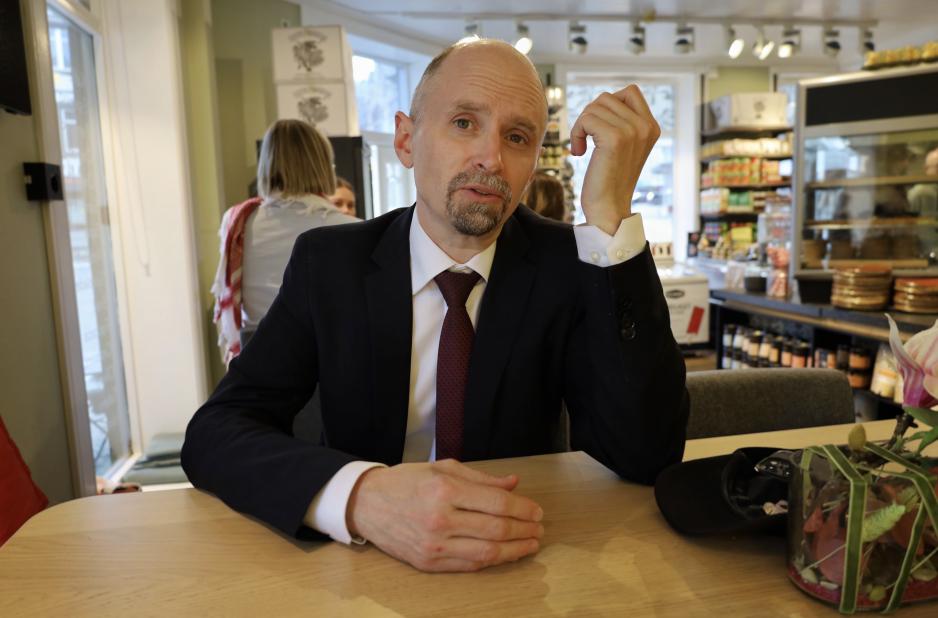
Sveen believes that smaller political units, such as a Northern Norwegian state, would provide better conditions for democracy – a shorter distance between the rulers and the ruled, between people's opinions and votes to political results. "But small units are naturally facing the problem of globalization. In an open, interwoven world, there is minimal room for making one's own choices," he points out. (Photo: Astri Edvardsen)
Problematization
Nording's testing grounds for grand ideas and utopias also include a problematization of their feasibility.
"I work a lot on twisting the matters so that relevant dilemmas must be discussed," says Sveen.
"Let me use an example from an assembly during the Sámi festival Márkomeannu last year: First, we had a vote on whether a Sámi state should be established, which is easy to support. Then, we followed up with a vote on how this Sámi state would manage financially. Would it go for duodji, the traditional Sámi handicraft, or industrialization with oil extraction and windmills? How could one realistically imagine such a state with a sustainable economy and access to energy?"
"In the face of such questions, things get more challenging. It is easy to say that one wants a Sámi state, but that also makes it harder to say no to windmills since also this state will need electricity. In Nordting, we also seek to work on such demanding issues."
For example, Nordting's ability to actualize conflicting situations and difficult questions offer was also expressed at its first assembly during the Arctic Arts Festival in 2014.
"At that point, it revolved around the Arctic Arts Festival's history and heavy sponsorship from Statoil [a Norwegian state-owned oil company, now called Equinor, ed. note]. This also involves a dilemma: Cultural actors are often against oil drilling but needs money to survive, and where should it come from? Do we want a well-financed and diverse cultural life or stop oil extraction?"
The spotlight on power
Another central aspect of Nordting is power analyses and critique of power – which is continuously needed to keep democracy in check.
In relation to the aforementioned exploration of ideas on independence and increased self-governance in various parts of the Arctic, the analyses look at the political and economic power, as well as the power of definition, that lies in the capitals of the South.
Analytical and critical takes on power relations are also applied to local communities that Nordting visits.
"We use the old method of 'following the money.' Who ends up with the big sums? In many local communities, these are naturally sensitive questions, but they are important to highlight," Sveen points and illustrates:
"We did a version of this under a major 'ting' during the Arctic Arts Festival five years ago. We presented tax lists and talked about ownership of buildings here in the center of Harstad. Everyone knows who the city's rich people are, and the tax lists are printed in the newspapers every year. Yet, it has a different effect when we present this in the city square for everyone to see: 'He owns that and that building, and the other guy owns the three buildings over there.'"
"I think it gives people a feeling that changing the distribution of money, property, and power is possible. And that one is not alone in wanting change."
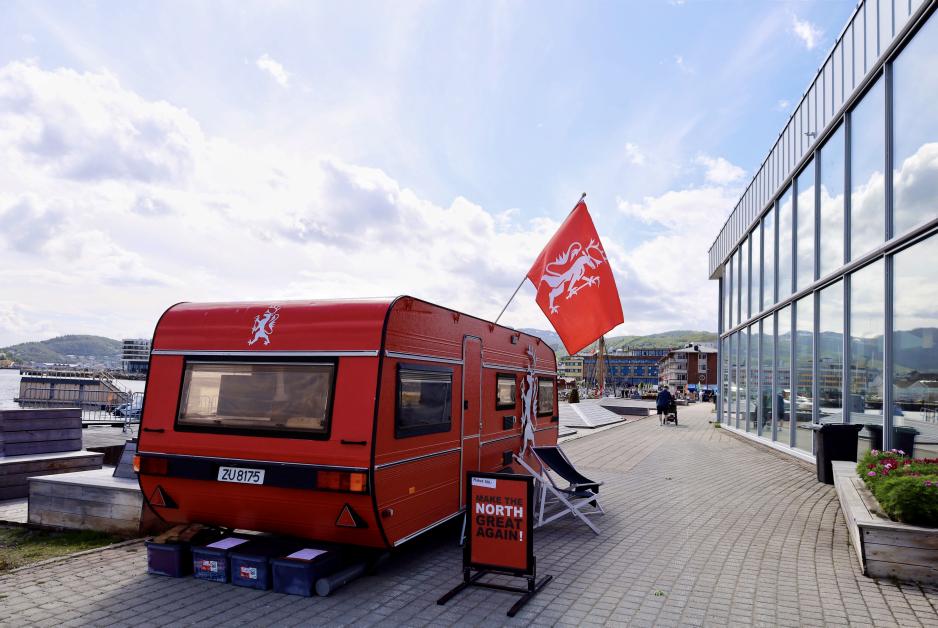
Nordting plays on Donald Trump's well-known election campaign slogan to turn old power relationships on their head. "This time, it is not a superpower that is going to be 'great again,' it is the North," states Nordting. Throughout the Arctic Arts Festival, its distinctive mobile home served as an arena for concerts and presentations, a bar serving vodka, and a nomad shop. (Photo: Astri Edvardsen)
Provided courage
"I had a strong experience the other day," Sveen continues along the same lines.
"A woman entered Nordting's mobile home and said she had attended an assembly in a local community where we talked about local distribution of power, as we usually do. How are income and assets distributed? Who owns central properties and businesses? The woman had been in conflict with one of the community's powerful people about a work matter. She believed that she had not gotten the salary she was entitled to and felt threatened."
"She then attended the assembly and experienced that we raised questions about power and were not afraid to showcase these influential people. This gave her the courage to think that it is possible to stand up against power. She took legal actions against the person in question, where she won and received a large compensation."
"This is a way that Nordting could have a more direct influence. Showcasing power can trigger awareness that it is possible to relocate it," he points out.
A Northern sphinx
Now, Nordting has also unveiled its large anniversary sculpture, 'The National Reindeer', which symbolizes Northern power and counter-power.
"The Norwegian state has a lion as its national emblem. Lions have little to do with Norway, especially Northern Norway. But the lion is an old symbol of the king and the king's power. It holds an axe, the ax of Olav the Saint, who Christianized Norway. The national lion is thus the symbol of king, church, and central power," says Sveen to the audience in Harstad during the unveiling.
"Nordting, on the other hand, has a reindeer, or actually a reindeer lion, as its emblem. We took Olav the Saint's ax, chopped off the lion's head, and put on a reindeer head. It may have the same body and muscles as the state but a completely different head. It thinks differently. It has a different attitude, a different goal. It protects something different."
He points out that the reindeer is found throughout the circumpolar Arctic and is a central symbol in indigenous traditions, such as the Sámi, and for the whole of the North.
"The reindeer lion is our sphinx, our griffin, our lucky charm, our guardian. Here it stands, with its gaze turned to the North. As a northern symbol of power. A power that springs from people in the North, control over their own resources."

During the Arctic Arts Festival, Sveen Nordting presented his whimsical new work of art: the white reindeer lion. The sculpture has a nomadic existence ahead of it. "It will not stay here in Harstad. I don't have clear plans for it yet, but I really want to take it to Oslo and place it in front of the Norwegian parliament at some point," he says. (Photo: Knut Åserud)
Addressing old views of people and power
Thus, Nordting and Sveen offer a new symbolism of power, in addition to a confrontation with the old. Such as statues of historical figures that today symbolize outdated perspectives on human beings and power.
In 2020, the movement visited Hamarøy, Northern Norway, and held a vote on whether the statue of Knut Hamsun – a renowned but controversial Norwegian author – should be removed. The vote resulted in a compromise: The statue was to be kept, but supplemented with a sign informing that Hamsun was a Nazi.
"This era's discussion of statues is complicated, but we are heading toward an understanding that we must do something about them. We cannot just have them be as they have always been," maintains Sveen and continues:
"We are now working on the story of Harstad's golden boy, the missionary and colonizer in Greenland, Hans Egede. We have not had a vote on his statue here, but we have taken the liberty of marking it with a sign. We did it on Greenland's national day, June 21st, so that people who see it get the whole story."
"I can understand that people in the 1950s and 60s operated with an understanding of Egede as a hero, but today, I find it strange that he still holds hero status. The statue of him was erected in 2008, and a new one was erected just a few years ago in Kabelvåg, Lofoten. We have added a sign to that one as well."
"How we understand the past and the present and what significance these markers in our public space hold and should hold is changing rapidly. I expect some action will be taken regarding several statues, including the one of Hamsun."
Dialogue on how we align
What about the trust in today's central political figures?
Sveen does not bring up the most obvious, i.e., the scandals of Norwegian politicians in the past few years, but still calls for more honesty from the political class.
"I wish politicians would admit to a greater extent that they do not have much room for action. Their leeway for various measures is quite limited, as today's political decisions are often about minor adjustments. This relates to people's trust in them," he says.
"Much of the politics is about selling messages about major change. In my eyes, this is one of the greatest dilemmas connected to our political system. We have set ourselves up with a focus on re-election and juicy election promises, but the leeway has been restricted."
"Trying out other democratic models for participation and revitalized trust could be exciting, without my knowing what that would look like."
Your co-panelist, Sanna-Kaisa Saloranta in the Finnish Innovation Fund Sitra, talked about how they work with citizen's panels that frequently discuss various issues and give recommendations for politicians – an input in addition to regular elections. Is this something you believe we should try in Norway?
"I believe that there is great room for action to test citizen panels and other democratic models. We often just accept that the political system must be the way it is. Just having an engaging conversation on how we organize our democracy is very important," Sveen responds.
The theatre of politics
In Nordting's relationship with the established politics, not only analysis and perspectives 'from the outside' are important, but also reflections of its 'theatrical traits.'
"We try to point to the theater of politics. Take any debate between politicians and it is clear that they assume roles and play out conflicts. It is close to being performance art: that you are yourself on stage, but in an enlarged version where you emphasize certain qualities," says Sveen and continues his argument:
"The way I see it, politicians work a lot with theatrical tools. For example, Sylvi Listhaug [leader of the Progress Party, ed. note] has been on a voice course and has lowered her voice. This is exactly how theater people work to produce a special effect. And when Erna Solberg [leader of the Conservative Party and former PM of Norway, ed. note] enters the stage on election night to a rock song while the confetti explodes, it is indeed an enormous staging."
"Nordting also uses this type of effects. For me, it's about reflecting the political system and stimulating democratic participation and interest. We now see that people are less engaged in political processes. I hope that what Nordting does can help change this."
And the manipulative
"And as I usually say about Nordting: like politicians, we also manipulate a lot. However, our attempts at manipulation are openly displayed, while people constantly try to hide it in politics," Sveen insists.
"We sing together. We dance together. We drink together. Trying out such community-building mechanisms. The manipulation in this is clear. You can take part in it and also think, 'Oh, this was a bit much. I let myself be completely carried away here.' You can be on both of those levels. And in my eyes, I truly believe that political power and political movements are largely built through feelings and the experience of belonging."
In today's Europe and the USA, political parties and movements on the far right are experiencing a significant upswing, and Sveen believes this may be linked to their skill at playing on emotions.
"Some have pointed out that the far right channels emotional engagement to politics in a way that trade unions or labor parties managed in the 1920s and 30s. There was community, red flags, and sing-alongs. People joined together, and there was a clear building of unity. You don't see as much of that on the left anymore, but rather on the right," he says and continues:
"We are trying to explore some of this in Nordting, recognizing that politics and emotions are connected. We vote not only with the brain, but also with the heart."
Watch the debate here (in English):
The panel
These also participated in the debate:
- Sanna-Kaisa Saloranta, Project Co-ordinator on the New Forms of Participation project at the Finnish innovation fund Sitra.
- Baard Herman Borge, Prof. at UiT, the Arctic University of Norway, Harstad.
- Roald Linaker, the Armed Forces Ombud, theologian, and deputy chairman of Bardu Labor Party.
Ingvild Austgulen, slam poet and folk rapper, provided a musical element.
The debate series
High Noon also included the following debates:
- Monday 24.06: Formative conditions in the North – outsiderness and violence in youth culture.´ (In Norwegian)
- Tuesday 25.06: Resilience in the North – are we prepared for what is in store? (in Norwegian)
- Thursday 27.06: Artists as moral compasses (in Norwegian)



